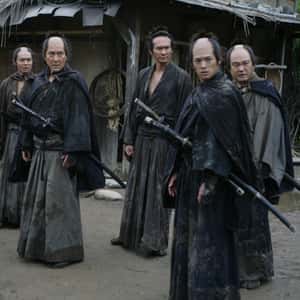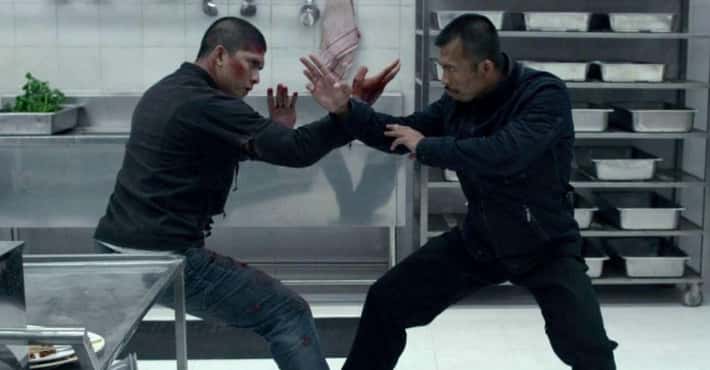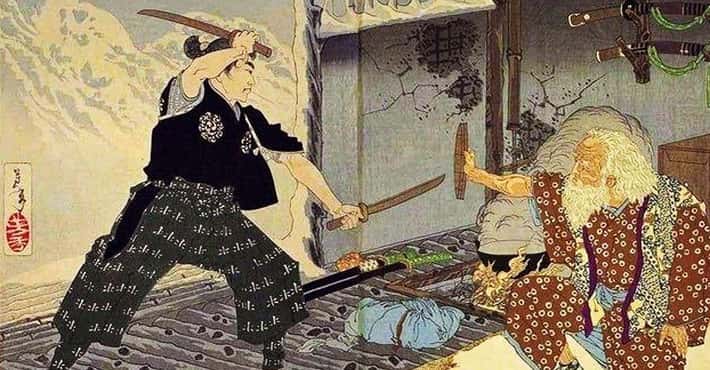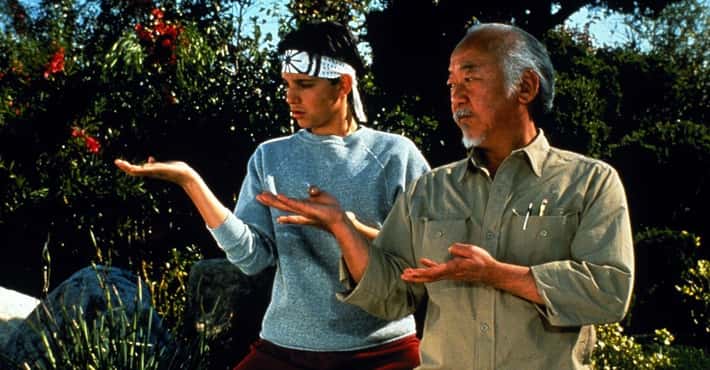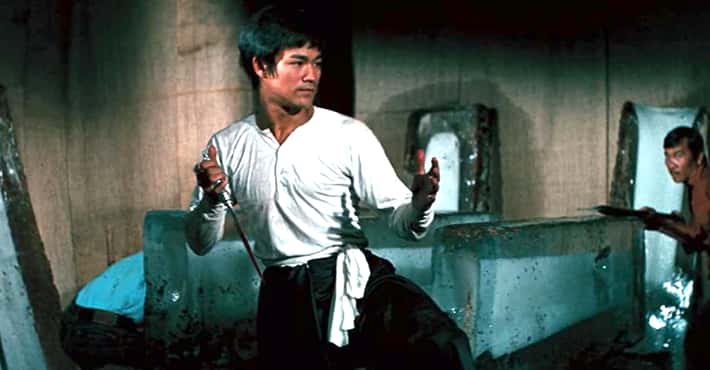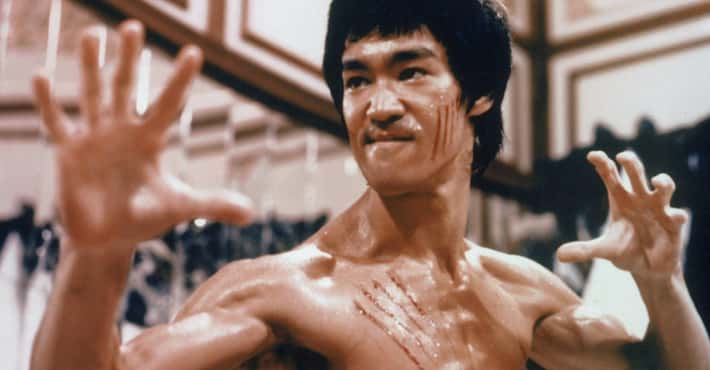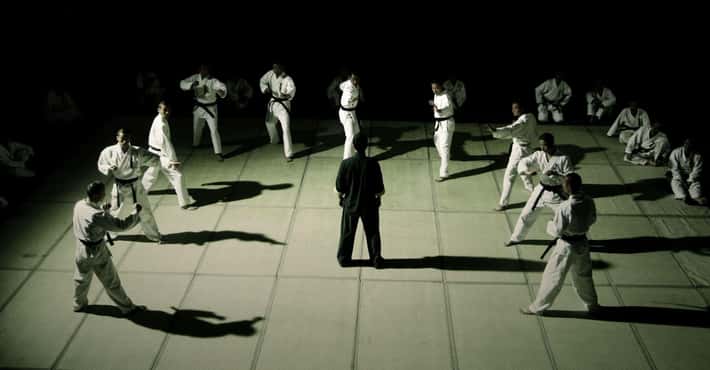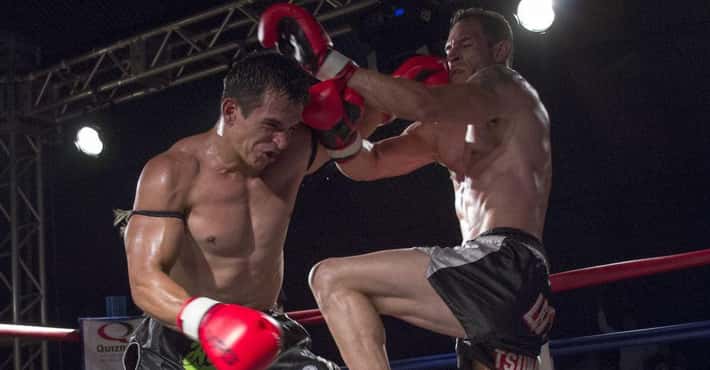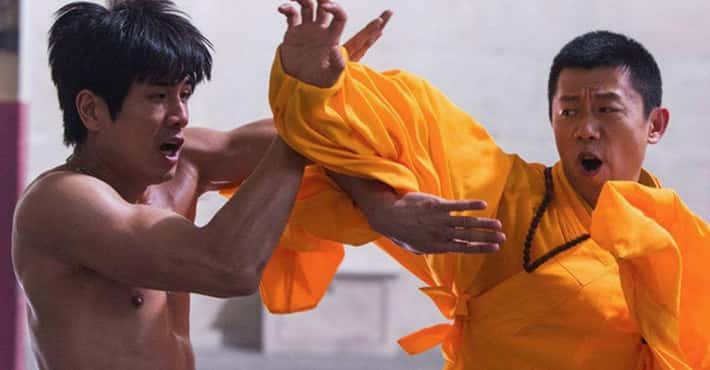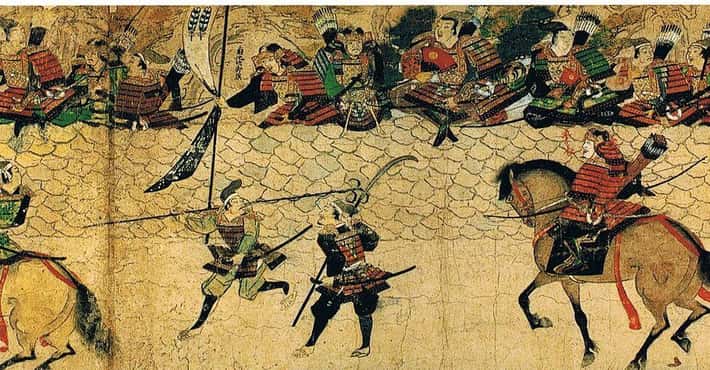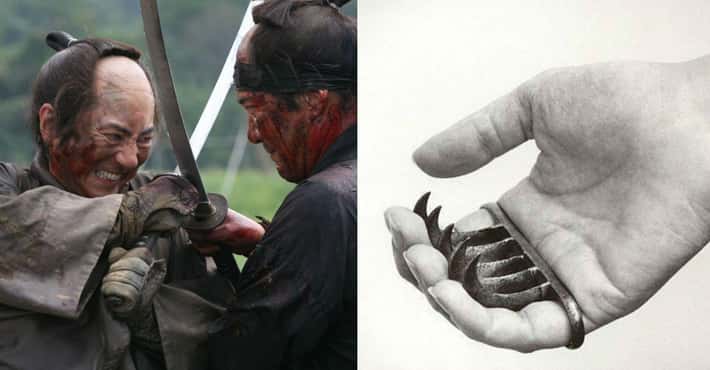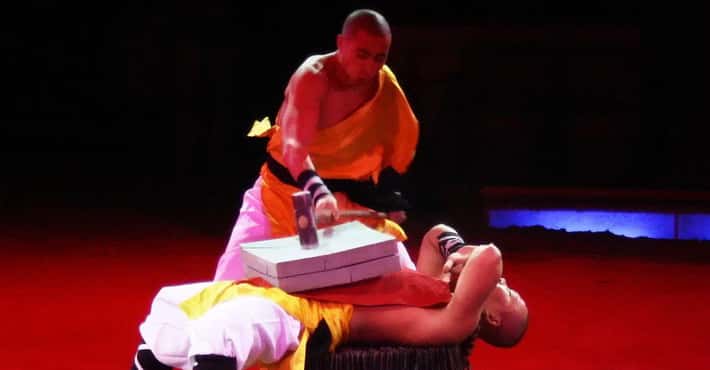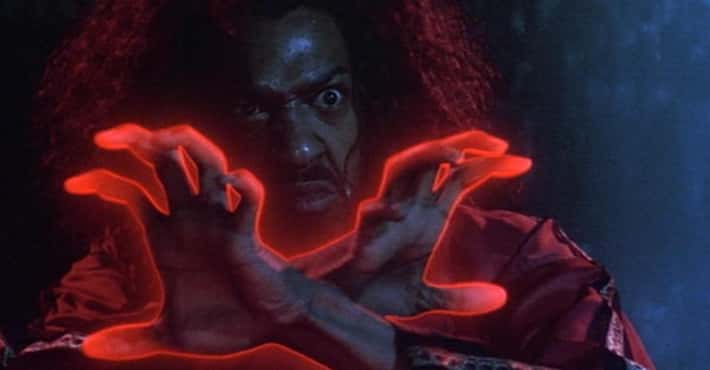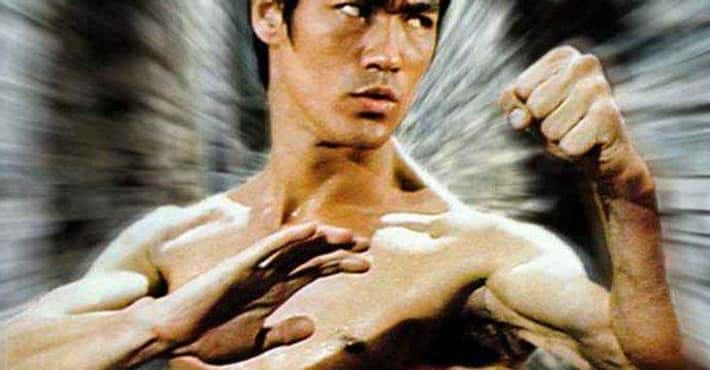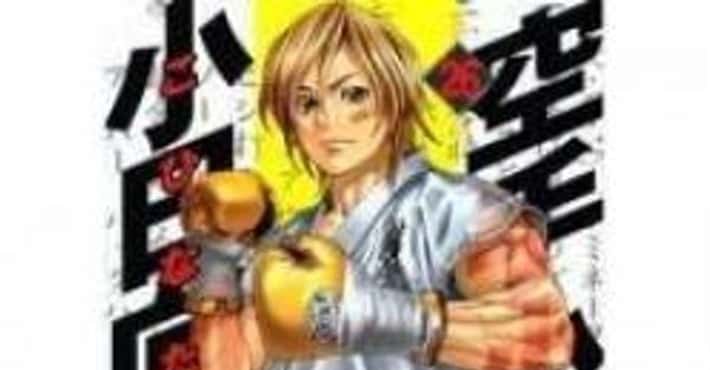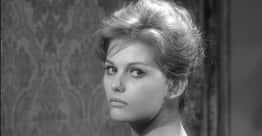The 75+ Best Samurai Movies Of All Time
- Toshiro Mifune, Takashi Shimura, Eijirō Tōno
Seven Samurai, directed by the legendary Akira Kurosawa, has been widely regarded as a masterpiece of Japanese cinema and is often considered one of the greatest films ever made. This epic samurai drama showcases the tale of a village under attack by bandits and their decision to hire seven skilled swordsmen to protect them. The film masterfully explores themes such as honor, loyalty, sacrifice, and redemption through its brilliantly choreographed battle scenes and intricate character development. With its stellar cast led by Toshiro Mifune, this three-hour-plus cinematic journey leaves an indelible mark on viewers with its powerful storytelling and captivating visual style.
More Seven Samurai- #105 of 262 onThe 200+ Best War Movies Of All Time
- #706 of 769 onThe Most Rewatchable Movies
- #172 of 191 onThe Best Movies For Men
- Toshiro Mifune, Tatsuya Nakadai, Etsuko Ichihara
A classic tale of revolt against tyranny, Samurai Rebellion tells the story of a loyal retainer who takes up arms against his lord when his family is torn apart by cruel injustice. Directed by Masaki Kobayashi, this 1967 film skillfully juxtaposes the tension between individuality and societal expectations in feudal Japan through its poignant story and striking visual compositions. Starring Toshiro Mifune and Yoko Tsukasa as the conflicted protagonists, Samurai Rebellion expertly weaves together themes such as honor, duty, love, and rebellion into a gripping drama that resonates deeply with audiences even decades later.
- Toshiro Mifune, Takashi Shimura, Tatsuya Nakadai
Akira Kurosawa's iconic 1961 film Yojimbo introduces viewers to the ronin Sanjuro (Toshiro Mifune), a wandering swordsman who finds himself caught in the middle of a vicious gang war in an isolated town. Employing his cunning tactics and superb swordsmanship skills for both personal gain as well as justice, Sanjuro sets out to eliminate both factions while maintaining his own moral compass amid chaos and duplicity. The film's sharp wit intertwined with exhilarating action sequences immortalizes Yojimbo not only as a foremost samurai movie, but also as the inspiration for subsequent Western films such as Sergio Leone's A Fistful of Dollars.
More Yojimbo- #112 of 167 onThe Greatest '60s Movies, Ranked
- #81 of 82 onThe Most Rewatchable Action Movies
- #35 of 47 onThe 45+ Best Swords and Sandals Movies
- Tatsuya Nakadai, Tetsurō Tamba, Akiji Kobayashi
Harakiri, directed by Masaki Kobayashi in 1962, is an intensely dramatic film that explores the devastating consequences of blind adherence to rigid codes of honor. Set in feudal Japan, it follows Hanshiro Tsugumo (Tatsuya Nakadai), a destitute samurai who seeks permission to commit ritual suicide at an esteemed lord's estate. The unfolding story gradually reveals a powerful tale of deception, vengeance and profound suffering brought about by oppressive hierarchy and merciless tradition. Featuring outstanding performances from its cast and a relentless critique of societal norms, Harakiri holds its own as one of the most thought-provoking samurai movies ever made.
- Shintaro Katsu, Shigeru Amachi, Eijirô Yanagi
The Tale of Zatoichi (1962) marks the beginning of one of Japan's most beloved film franchises with Shintaro Katsu embodying the titular character – a blind masseur and expert swordsman. Directed by Kenji Misumi, this engrossing tale delves into themes of moral ambiguity, social prejudice, and redemption as Zatoichi becomes embroiled in conflicts between rival yakuza gangs while seeking solace outside his violent past. With exceptional swordplay sequences and nuanced character portrayals that surpass genre conventions, The Tale of Zatoichi offers viewers an authentic glimpse into Edo-period Japan through its rich storytelling and evocative atmosphere.
- Toshiro Mifune, Takashi Shimura, Tatsuya Nakadai
Sanjuro (1962) reunites director Akira Kurosawa with Toshiro Mifune for another thrilling adventure featuring the wandering swordsman from Yojimbo. This time, Sanjuro finds himself aiding a group of inexperienced young samurai seeking to expose corruption within their clan while navigating a web of deceit among powerful adversaries. Combining razor-sharp humor with exhilarating action sequences and memorable character interactions, Sanjuro offers audiences an entertaining blend of genres that showcases Kurosawa's masterful storytelling and Mifune's magnetic screen presence.
- Toshiro Mifune, Takashi Shimura, Isuzu Yamada
Akira Kurosawa's 1957 masterwork Throne of Blood adapts Shakespeare's Macbeth into feudal Japan with Toshiro Mifune delivering an electrifying performance as the ambitious warrior Washizu Taketoki who spirals down a path to self-destruction driven by greed and paranoia amid supernatural manipulations orchestrated by his malevolent wife. The film's haunting atmosphere, heightened by misty landscapes and a chilling score, enhances the Shakespearean tragedy's dark themes of ambition, power, and treachery as it translates seamlessly into the world of samurai warriors. Throne of Blood stands as a prime example of Kurosawa's creative prowess in reinterpreting classic literature through the dynamic lens of Japanese cinema.
- Hiroyuki Sanada, Rie Miyazawa, Tetsurō Tamba
Set in 19th century Japan during the decline of the samurai era, Yoji Yamada's 2002 film The Twilight Samurai follows the humble life story of Seibei Iguchi (Hiroyuki Sanada), a low-ranking samurai struggling to balance his familial responsibilities with his fading warrior lifestyle amid societal change. The film's poignant story features powerful emotional undercurrents, subtle character development, and engrossing romantic tension that evoke themes of love, loyalty, and honor. The Twilight Samurai garnered widespread acclaim for its sensitive portrayal of a bygone era and earned numerous accolades, including an Academy Award nomination for Best Foreign Language Film.
- Kôji Yakusho, Takayuki Yamada, Yusuke Iseya
Takashi Miike's 2010 epic action film 13 Assassins showcases a group of elite samurai who take on the daunting task of assassinating an evil lord threatening the stability of feudal Japan. Assembling a skilled team with various backgrounds, the samurai embark on a perilous journey fraught with danger, betrayal and bloodshed in their pursuit to restore justice. Employing thrilling action sequences, intricate plotlines and engaging character dynamics, 13 Assassins effectively balances brutal violence with enthralling storytelling that immerses audiences in a visceral cinematic experience.
More 13 Assassins- #181 of 191 onThe Best Movies For Men
- #83 of 114 onThe Greatest Movie Remakes Of All Time
- #150 of 200 onThe 195+ Greatest Adventure Movies
- Toshiro Mifune, Takashi Shimura, Makatari Fujiwara
Akira Kurosawa's 1958 adventure film The Hidden Fortress tells the story of two bumbling peasants unwittingly caught up in a dangerous mission to smuggle a young princess through enemy territory during wartime Japan. With its vivid characters, rousing action scenes and captivating cinematography – particularly the sweeping landscapes captured through expert widescreen compositions – The Hidden Fortress offers moviegoers an exhilarating blend of swashbuckling adventure and human drama infused with Kurosawa's masterful touch as it paved way for George Lucas' Star Wars saga years later.
- Chôjûrô Kawarasaki, Yoshizaburo Arashi, Mantoyo Mimasu
Kenji Mizoguchi's 1941 epic film The 47 Ronin is revered as one of Japan's most significant cinematic achievements for its stirring portrayal of the legendary tale surrounding a loyal group of samurai who embark on a perilous quest for vengeance following their lord's unjust death. Exemplifying patriotism, loyalty and honor through its meticulously crafted storytelling and strong ensemble cast led by Chojuro Kawarasaki, this two-part masterpiece has etched itself into the annals of classical Japanese cinema with its timeless exploration of human emotions amidst political turmoil.
- Toshiro Mifune, Kōji Tsuruta, Kaoru Yachigusa
The thrilling conclusion to Hiroshi Inagaki's Samurai Trilogy, Samurai III: Duel at Ganryu Island (1956) chronicles the final chapter of legendary swordsman Musashi Miyamoto's life (Toshiro Mifune) as he faces his ultimate rival Sasaki Kojiro (Koji Tsuruta) in an iconic duel that has captivated generations of samurai movie enthusiasts. Showcasing mesmerizing action sequences, poignant character development and breath-taking cinematography that immerses viewers into the compelling world of Japan's most revered warriors, this climactic installment solidifies the trilogy's status as an enduring classic in Japanese cinema history.
- Tatsuya Nakadai, Mieko Harada, Akira Terao
Ran (1985), directed by Akira Kurosawa at the height of his career, adapts William Shakespeare's King Lear into feudal Japan as it follows aging warlord Hidetora Ichimonji (Tatsuya Nakadai) whose decision to divide his kingdom among his three sons yields disastrous consequences fueled by power struggles and betrayals that culminate in a tragic denouement. With its stunning visual grandeur, epic battle scenes, and masterful performances, Ran is lauded as one of the most ambitious and visually spectacular works in Kurosawa's illustrious filmography while exploring themes of power, ambition, and familial discord with profound depth.
More Ran- #200 of 262 onThe 200+ Best War Movies Of All Time
- #246 of 675 onThe Best Movies Roger Ebert Gave Four Stars
- #71 of 96 onThe 90+ Best Movies Of 1985, Ranked
- 14
The Thirteen Assassins
Takayuki Akutagawa, Chiezô Kataoka, Kôtarô SatomiEiichi Kudo’s 1963 historical drama The Thirteen Assassins is renowned for its captivating portrayal of samurai warfare and political intrigue during Edo-period Japan. The film follows a skilled group of samurai enlisted by a high-ranking government official to overthrow an ambitious but ruthless lord who threatens the Shogunate's stability. With its intense battle scenes, complex character dynamics, and intricate plotting, Kudo’s gripping epic offers viewers a fascinating glimpse into the intricacies of feudal Japanese society and politics interlaced with themes of honor, loyalty and sacrifice.
- Tatsuya Nakadai, Kenichi Hagiwara, Kaori Momoi
In Kagemusha (1980), visionary director Akira Kurosawa crafts a powerful tale of deception and identity set against the backdrop of warring feudal Japan through a thief who's enlisted to impersonate a dying warlord – a role that ultimately consumes him beyond recognition amid political intrigue and military conflict. With its richly layered story imbued with themes such as loyalty, honor, ambition and illusion; striking visual elements including bold color schemes and sweeping battle scenes; and riveting performances led by Tatsuya Nakadai in dual roles; Kagemusha represents another cinematic triumph for Kurosawa that garnered widespread acclaim worldwide including Palme d'Or honors at Cannes Film Festival.
More Kagemusha- #245 of 257 onThe 200+ Best War Movies Of All Time
- #300 of 675 onThe Best Movies Roger Ebert Gave Four Stars
- #55 of 64 onThe Best Movies Of 1980
- Toshiro Mifune, Hideyo Amamoto, Akihiko Hirata
Kihachi Okamoto's 1965 film Samurai Assassin intertwines history and fiction as it tells the story of Niiro Tsuruchiyo (Toshiro Mifune), a ronin entangled in political unrest leading up to the infamous Sakurada Gate Incident that marked a turning point in Japanese history. Set against the backdrop of an unstable samurai society on the brink of collapse, this engaging drama is fueled by expertly choreographed action sequences, striking visual compositions and powerful performances by its stellar cast including Mifune's captivating portrayal of a man caught between his desire for revenge and search for identity amid chaos.
- 17
The Tale of Zatoichi Continues
Shintaro Katsu, Tomisaburo Wakayama, Eijirô YanagiAfter establishing Shintaro Katsu as one of Japan's most iconic screen heroes in The Tale of Zatoichi (1962), director Kazuo Mori returned with this thrilling sequel in 1963 that further explores the adventures of the blind swordsman as he faces new adversaries while grappling with his mysterious past. The Tale of Zatoichi Continues showcases exhilarating swordplay scenes, poignant character development and evocative atmosphere which have helped cement this long-running franchise among Japan's greatest cinematic treasures while offering audiences an unforgettable journey into the heart of Edo-period Japan.
- Akiji Kobayashi, Tomisaburo Wakayama, Shin Kishida
The second installment in Kenji Misumi’s acclaimed Lone Wolf and Cub series – Baby Cart at River Styx (1972) – continues the saga of master swordsman Ogami Itto (Tomisaburo Wakayama) who roams feudal Japan as assassin-for-hire with his young son Daigoro in tow. This cult classic offers a gritty and unflinching portrayal of the samurai world, complete with brutal violence, bloodshed and relentless action sequences that maintain a tight grip on viewers from beginning to end. With its memorable characters, striking visuals, and compelling storytelling, Baby Cart at River Styx remains an emblematic film that helped define the chanbara genre in Japanese cinema.
- 19
Sword of Desperation
Fumiyo Kohinata, Etsushi Toyokawa, Jun MurakamiSword of Desperation is a 2010 action history film written by Shûhei Fujisawa and directed by Hideyuki Hirayama. - Miki Nakatani, Ryo Kase, Hideaki Ito
Yojiro Takita's 2002 film When the Last Sword Is Drawn explores the lives of two samurai during the waning days of feudal Japan as they grapple with changing times amidst societal upheaval that threatens their very way of life. Set against the backdrop of a fading samurai era and told through a series of flashbacks, this moving drama delves into themes such as loyalty, honor, friendship and loss while offering viewers an emotionally charged story punctuated by superb performances from actors Kiichi Nakai and Koichi Sato in their respective roles.
- Tetsurō Tamba, Mikijiro Hira, Makatari Fujiwara
Hideo Gosha's directorial debut, 1964's Three Outlaw Samurai, presents a gripping tale of three rogue samurai who join forces with downtrodden villagers against oppressive aristocracy in feudal Japan. With engaging character arcs, thrilling swordplay sequences and exemplary performances from actors Tetsuro Tamba, Isamu Nagato and Mikijiro Hira, this film captivates audiences through its gritty exploration of justice, moral ambiguity and human nature. Three Outlaw Samurai has since become an influential entry within the chanbara genre that showcases Gosha’s unique approach to storytelling and innovative visual style.
- Takako Matsu, Chieko Baisho, Ken Ogata
Yoji Yamada's 2004 period drama The Hidden Blade follows the life of low-ranking samurai Munezo Katagiri (Masatoshi Nagase) during an era of social upheaval in 19th century Japan as he confronts corruption within his clan while rediscovering his lost love amidst looming Western influences that threaten traditional values. The film skillfully blends elements of romance, political intrigue and thrilling action to create a captivating story infused with themes such as honor, loyalty and change. Lauded for its intriguing character development and evocative cinematography that transports viewers into a bygone era of samurai society, The Hidden Blade offers a poignant exploration of human emotions amid historical transitions.
- Tatsuya Nakadai, Tetsurō Tamba, Yorozuya Kinnosuke
Hideo Gosha's 1969 samurai film Goyokin tells the story of Magobei (Tatsuya Nakadai), a skilled swordsman who returns to his hometown following an absence only to find himself caught in a web of deception, betrayal and bloodshed that threatens the lives of innocent villagers. Known for its stunning cinematography showcasing Japan's breathtaking landscapes; as well as thrilling action sequences that push the boundaries of chanbara filmmaking; Goyokin offers viewers a compelling story punctuated by themes such as honor, loyalty and vengeance while leaving an indelible mark on the genre.
- Shintaro Katsu, Jun Hamamura, Tomisaburo Wakayama
Baby Cart to Hades (1972), directed by Kenji Misumi, is the third installment in the renowned Lone Wolf and Cub series featuring Tomisaburo Wakayama's iconic portrayal of wandering swordsman Ogami Itto who traverses feudal Japan alongside his young son Daigoro while embarking on dangerous missions that test their skills against formidable adversaries. With intense action scenes laden with gore, suspenseful plot lines fueled by vengeance and betrayal; as well as engaging character dynamics that delve deep into themes such as honor, loyalty and familial bond; Baby Cart to Hades offers viewers another exhilarating chapter in the continuing adventures of one of cinema's most legendary samurai duos.
- Toshiro Mifune, Takashi Shimura, Machiko Kyō
Akira Kurosawa's groundbreaking 1950 film Rashomon delves into the subjective nature of truth as it explores conflicting accounts surrounding the murder of a samurai recounted by four witnesses – each harboring their own perspectives on the tragic event. With its pioneering story structure that challenges conventional storytelling norms, stellar performances led by Toshiro Mifune and Masayuki Mori; as well as evocative cinematography that heightens tension between characters caught in a web of deceit; Rashomon marked a turning point for Japanese cinema while garnering international acclaim including an honorary Academy Award for Best Foreign Language Film during its time.
More Rashomon- #21 of 425 onThe Greatest Movies in World Cinema History
- #15 of 41 onThe 100+ Best Movies Streaming On The Criterion Channel
- #28 of 51 onThe Best Movies Based on Short Stories
- Naoto Takenaka, Kōji Yakusho, Hikari Mitsushima
Acclaimed director Takashi Miike breathes new life into Masaki Kobayashi's classic Harakiri with his 2011 adaptation titled Hara-Kiri: Death of a Samurai. Retaining the original film's poignant themes regarding honor, sacrifice and societal oppression while incorporating fresh perspective through visually striking 3D imagery; Miike stays faithful to the source material yet elevates it with his unique cinematic flair that has been a hallmark of his diverse oeuvre. Featuring captivating performances by Ebizo Ichikawa, Eita and Hikari Mitsushima; this contemporary take on a timeless story not only pays homage to its esteemed predecessor, but also allows new audiences to experience the dramatic power of samurai cinema in an innovative context.
- Toshiro Mifune, Tatsuya Nakadai, Yūzō Kayama
Kihachi Okamoto's 1966 film The Sword of Doom follows the life of a merciless samurai Ryunosuke (Tatsuya Nakadai) who descends into madness after embracing his dark nature through acts of violence and bloodshed. Known for its complex story structure that delves deep into themes regarding morality, fate and karma; captivating performances from its stellar cast including Toshiro Mifune in a supporting role; as well as expertly choreographed swordplay sequences that have become a hallmark of Japanese chanbara cinema; The Sword of Doom remains a classic within the genre that continues to enthrall audiences with its unique blend of intrigue, action and psychological drama.
- Toshiro Mifune, Kōji Tsuruta, Mariko Okada
Hiroshi Inagaki's 1955 follow-up to his acclaimed Samurai I: Musashi Miyamoto – Duel at Ichijoji Temple – continues the thrilling journey of legendary swordsman Musashi Miyamoto (Toshiro Mifune) as he pursues mastery in the art of swordsmanship while facing formidable challenges both physically and mentally. With breathtaking action sequences that showcase Mifune's dynamic prowess as an actor; sumptuous visuals that immerse viewers into the world of feudal Japan; and engaging plot lines that delve deeper into the protagonist's complex character development; Samurai II solidifies its place within Inagaki's celebrated trilogy as an indispensable chapter in the life of one of Japan's most revered warriors.
- Toshiro Mifune, Rentarō Mikuni, Kuroemon Onoe
The first entry in Hiroshi Inagaki’s acclaimed Samurai Trilogy, 1954’s Samurai I: Musashi Miyamoto traces the transformation of wayward youth Takezo (Toshiro Mifune) into renowned swordsman Musashi Miyamoto through a series of trials, tribulations and self-discovery set against the backdrop of feudal Japan. As Takezo navigates treacherous terrain fraught with conflict, danger, love and loss; viewers are treated to a captivating story imbued with themes such as honor, redemption and personal growth. With outstanding direction from Inagaki alongside Mifune’s charismatic portrayal as the titular character, Samurai I sets the stage for an epic adventure that continues to captivate audiences around the world.
- 30
The Loyal 47 Ronin
Shintaro Katsu, Machiko Kyō, Chikage AwashimaDirected by Kunio Watanabe in 1958, The Loyal 47 Ronin is yet another interpretation of the legendary tale surrounding a group of leaderless samurai who set out on a perilous mission to avenge their lord's unjust death. Featuring an ensemble cast led by Kazuo Hasegawa and Raizo Ichikawa, this black-and-white classic explores themes such as honor, loyalty, sacrifice and redemption through its tightly woven story and expertly choreographed battle scenes. As one of the many adaptations involving this timeless story, The Loyal 47 Ronin has carved out its own niche within Japanese cinema history for its dramatic retelling that resonates with audiences even today.










